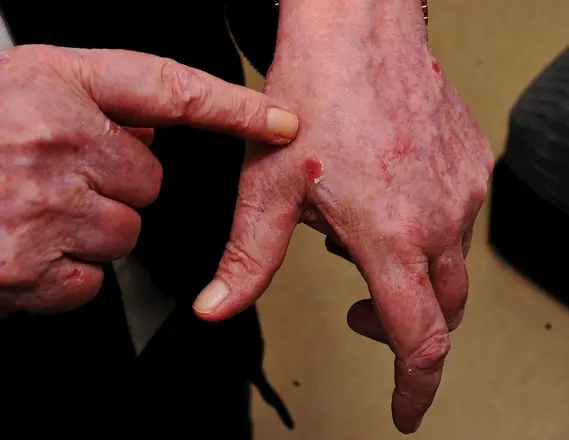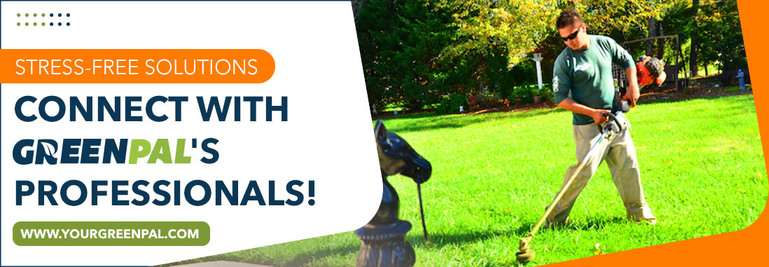It’s not “if,” but “what” protection should be worn
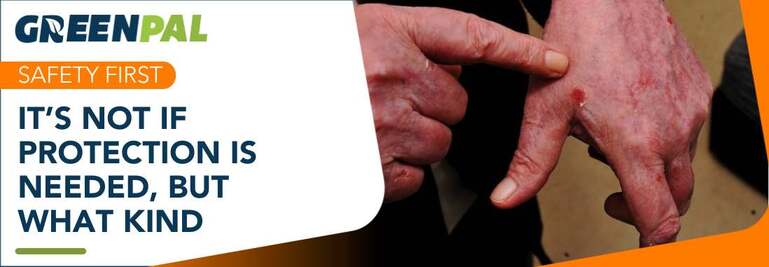
In this brief guide you will learn nearly everything you need to know about PPE and pesticide application.
Look, it may seem like a nuisance to cover yourself in Personal Protective Equipment (PPE) every time the lawn needs to be sprayed with pesticides.
However, it is important to recognize the potential danger of pesticides and other harmful chemicals.
Especially when they come in direct contact with your skin or enter the body through any orifice.
So how should you protect yourself when using pesticides?
Let’s take a look!
Why is PPE Important Every Time you Use Pesticides?
According to the Global Healing Center, pesticides can cause damage to the endocrine system as well as increase the chances of developing cancer.
90% of chemical exposure occurs through the skin, therefore it is very important to wear PPE’s when spraying pesticides. Every time.
These risks are only magnified by people who use pesticides repeatedly, without proper protection.
It's true, some products may not be terribly harmful the first time you are exposed to them. But repeated exposure is another story. Take Roundup for example.
It never hurts to go above and beyond to protect yourself while using pesticides.
Additional Risks in Lawn Care
In addition to chemical risks, lawn care itself can pose unexpected dangers. An insightful article from GreenPal highlights why mowing your lawn could be potentially hazardous. This underscores the importance of being vigilant about safety in all aspects of lawn maintenance, not just when handling chemicals.
So what specific type of personal protective equipment should be worn?

PPE #1- Respiratory Protection
Choose an approved respirator that is appropriate for the chemical being used and duration of likely exposure.
This will prevent any inhalation of harmful over spray that can cause damage to the lungs.
Here are key points to consider:
- Ensure the respirator is NIOSH-approved and meets the requirements listed on the pesticide label
- Types include:
- Disposable respirators
- Reusable half-mask respirators
- Full-face respirators
- Ensure proper fit and seal for maximum effectiveness.
- Replace cartridges/filters regularly according to manufacturer instructions.
Respiratory protection is a critical component of a comprehensive PPE strategy for safe pesticide application.
Refer to the Occupational Health & Safety respirator fact sheet for more information on specifics.
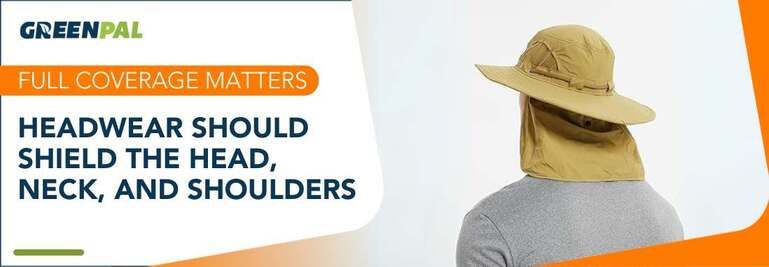
PPE #2- Headwear
Proper headwear is crucial for protecting the head, neck, and face from pesticide exposure.
When selecting and using headwear for pesticide application:
- Choose waterproof, washable materials
- Avoid leather or cloth sweatbands, as they can absorb pesticides
- Ensure the headwear covers the head, neck, and upper shoulders completely
- Use only CSA-approved safety hats with rain brims
- Options include:
- Chemical-resistant hoods
- Wide-brimmed hats
- Hard hats (when overhead hazards are present)
-
Avoid baseball caps or visors, as they provide inadequate coverage
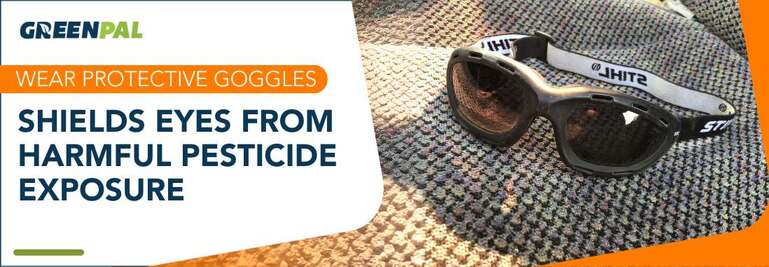
PPE #3- Eye Wear
Wear chemical protective goggles or a face shield at all times when mixing or spraying pesticides.
Get this, even some household pesticides can cause temporary or even permanent blindness.
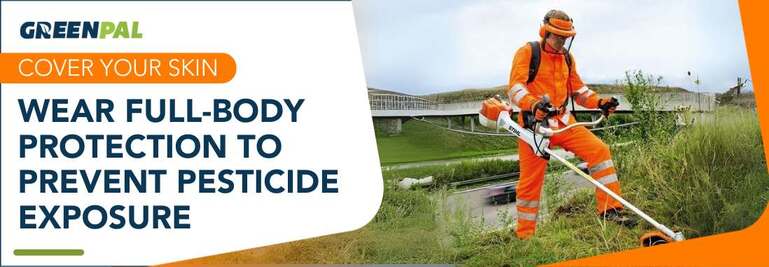
PPE #4- Protective Clothing
Make sure your entire body is covered and no skin is exposed, therefore eliminating potential skin irritation.
If available, wear rubber or vinyl coveralls and unlined rubber boots.
If possible, canvas, cloth, or leather clothing should be avoided as they have a greater absorbency potential.
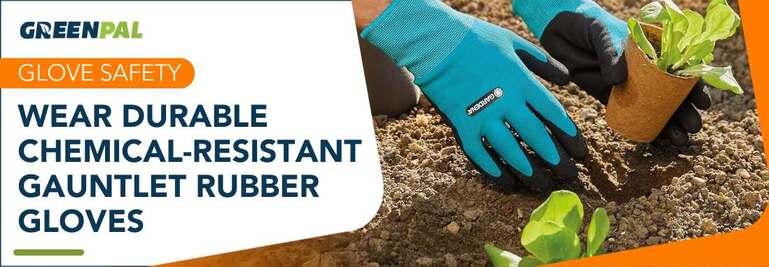
PPE #5- Gloves
Wear durable, chemical protective gauntlet rubber gloves which extend up the forearm.
Again, stay away from leather, paper, or fabric gloves as these materials absorb and hold liquids.
Protecting the hands will not only prevent skin irritation, but will also reduce the risk of spreading any chemical exposure once the gloves are removed.
Going Beyond PPE When Spraying Pesticides
Get this, simply wearing PPE is not enough. Many lawn care professionals in Roswell, Georgia are adamant about cleaning their PPE.
“For PPE to be effective, it must be regularly cleaned, maintained, and properly disposed when it reaches its end of life.” -Logan with LA Lawns says,
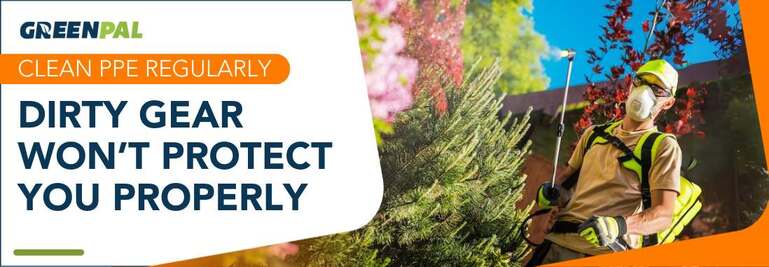
Procedures for Washing PPE After Pesticide Application
When you are done with your PPE, be sure to practice the following procedures for maximum protection.
Wash goggles with soap and water and then sanitize by soaking for 2 minutes with 2 tablespoons of chlorine bleach. Rinse thoroughly and air dry.
Wash all clothing worn during treatment separate from any other articles of clothing. Make sure to use hot water on the longest cycle and use heavy-duty liquid detergent.
Wash gloves with soap and hot water before removing them. This protects the skin from the pesticide residue. Once gloves have been washed and removed, immediately wash hands and face with soap and water.
Check expiration dates on all masks and filters. Over time, these items can get old and not be effective. If outdated, you may be unknowingly breathing in harmful pesticide chemicals.
Finally, it is important to be clear that this article is not an indictment of pesticide usage.
Ryan Mefford with Beast Mowed Lawncare, one of the largest mowing companies in Murfreesboro, Tennessee, has been using pesticides on a near-daily basis.
“In most circumstances, pesticides can be sprayed without harm to any involved parties. Just keep in mind a few things—wearing the proper protection can significantly decrease the odds of any inhalation or skin irritation; properly washing and disposing of worn out protective gear is just as important.” -Ryan says.
TLDR; Wear layers of protection when using pesticides!
Why? Pesticides can harm your lungs, eyes, and skin.
What to wear:
- Respirator (choose the right one for the chemical)
- Waterproof hat, helmet, or hood
- Chemical goggles or face shield
- Rubber or vinyl coveralls and boots
- Chemical-resistant gloves (up to your forearms!)
Clean your gear after use! Wash clothes separately, wash gloves before taking them off, and sanitize goggles & masks.
Bonus tips:
- Don't use pesticides you're not licensed for.
- Hire a pro if you need lawn help.
The Bottom Line on Using the Right Protective Gear When Spraying Pesticides
When chemical products like pesticides are used, take proper precautions.
Always abide by the PPE requirements listed on the label, and it likely won’t hurt to exceed the requirements.
Avoid exposure from your PPE itself by washing or disposing used PPE as needed.
Finally, if you are not licensed to use a pesticide that requires one, do not apply it! Hire a professional pesticide applicator.
And if you need help around the lawn, hire one of the pros from GreenPal!



 Share
Share